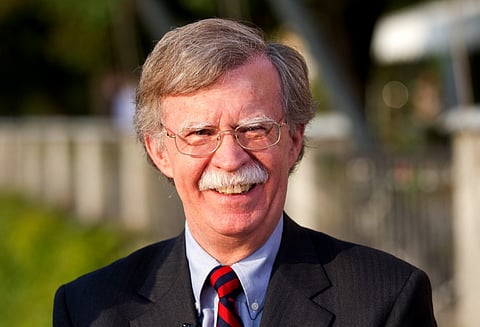For global security, Europe must lead from the front
EU’s responsibility towards resolving strategically vital issues and ensuring a peaceful world has never been greater

The newly nominated National Security Adviser of the United States, John Bolton, has increased risks about what direction President Donald Trump’s foreign policy is taking. These concerns are not confined to the national remit, but they cross the world, particularly into Europe, the Middle East and beyond.
In addition to Bolton’s appointment, the president’s nomination of both the former director Central Intelligence Agency, Mike Pompeo, replacing Rex Tillerson, and Gina Haspel as the new CIA chief, is greatly adding to the anxiety.
Both nominations require Congress’s approval while the national security adviser, whose job is to maintain links between intelligent services and the White House, is directly appointed by the president. Gina Haspel’s selection has been widely criticised with the New York based Human Rights Watch (HRW) calling on the US Senate to oppose the nomination. In its letter to the Senate’s leadership and Select Committee on Intelligence, HRW said that Haspel was closely involved in the torture of detainees under the CIA’s Rendition, Detention and Interrogation (RDI) programme and the destruction of related evidence in Iraq during the Bush Administration. HRW believes that what is already known about Haspel’s role in the RDI programme is sufficiently enough to disqualify her from serving as CIA director.
Hawks Quartet
With Nimrata (Nikki) Haley, US ambassador to the United Nations, already on board the Trump administration, we have now what one might call the “Hawks Quartet”. This would make this administration probably the most extreme since George W. Bush’s, led by the most populist president whose random tweets have become a daily exercise adding confusion to the prevailing anxiety.What makes this state more worrying is the fact that the US still remains unchallenged as a military power in the world. Last century’s World Order, or what was known as “balance of fear”, of the 1960s and 1970s has somehow succeeded in keeping contentious powers from destroying each other.
There are a great many risks that are facing so many countries in the world. These are not limited to the US, specially in the last 14 months, but have also surfaced in Europe because of the rise of populism in the EU (as results of the latest elections have shown in Italy), including of course Brexit in the UK.
Such changes will drastically impact events in the Middle East, the Gulf and North Africa and there is already evidence confirming this. With the absence of such “great powers” in control of world order, we can see the unprecedented easy rise of medium or even weaker powers, using new technology to create havoc in the world.
Countries such Iran, Russia, Israel and Turkey top the list of such powers who seem to be able — under the current circumstances — to freely do what they want. Such powers should not be allowed to get away with murder because this is precisely what they do. This is the policy they are implementing from Tehran to Iraq, Syria, Lebanon, Egypt, Libya, the Yemen: policy of war, instability and poverty.
Unprecedented challenges
Even if these powers did succeed in their sinister endeavours they will fail miserably in sustaining the status quo for a long time or financing the colossal rebuilding cost. This puts the so-called transatlantic partnership at a crossroads in facing up to the most acute and unprecedented challenges. However, this relationship has seen tremendous transformation since Trump won 2016 presidential election. Since his victory in the presidential election, Trump’s tweets and actions have called into question what has been known until now as the ‘Unified West’.
With the hawkish quartet in place, it is feared that the Trump administration will go further in weakening the Western alliance.
The American president has on several occasions over the last 14 months ridiculed the principles that clearly distinguished the transatlantic relationship since the 1950s. This is abundantly obvious in relation to many issues such as human rights, the Middle East problem, international law and multilateral agreements. What we have instead is a situation whereby community leaders in civil societies and policymakers in Europe are waking up almost daily to every tweet from the occupant in the White House that increasingly adds disquiet to the already existing anxiety. It is apparent the US under Trump and the EU will fearfully end up going in different directions over strategically vital issues like Iran’s destructive policy in the region, Israel’s disregard of international laws concerning Palestinian rights, proliferation and threats of nuclear weapons and the Paris climate accord. The EU is urgently required to come up with a joint strategy to wisely handle these changes.
Mustapha Karkouti is a columnist and former president of the Foreign Press Association, London. Twitter: @mustaphatache


